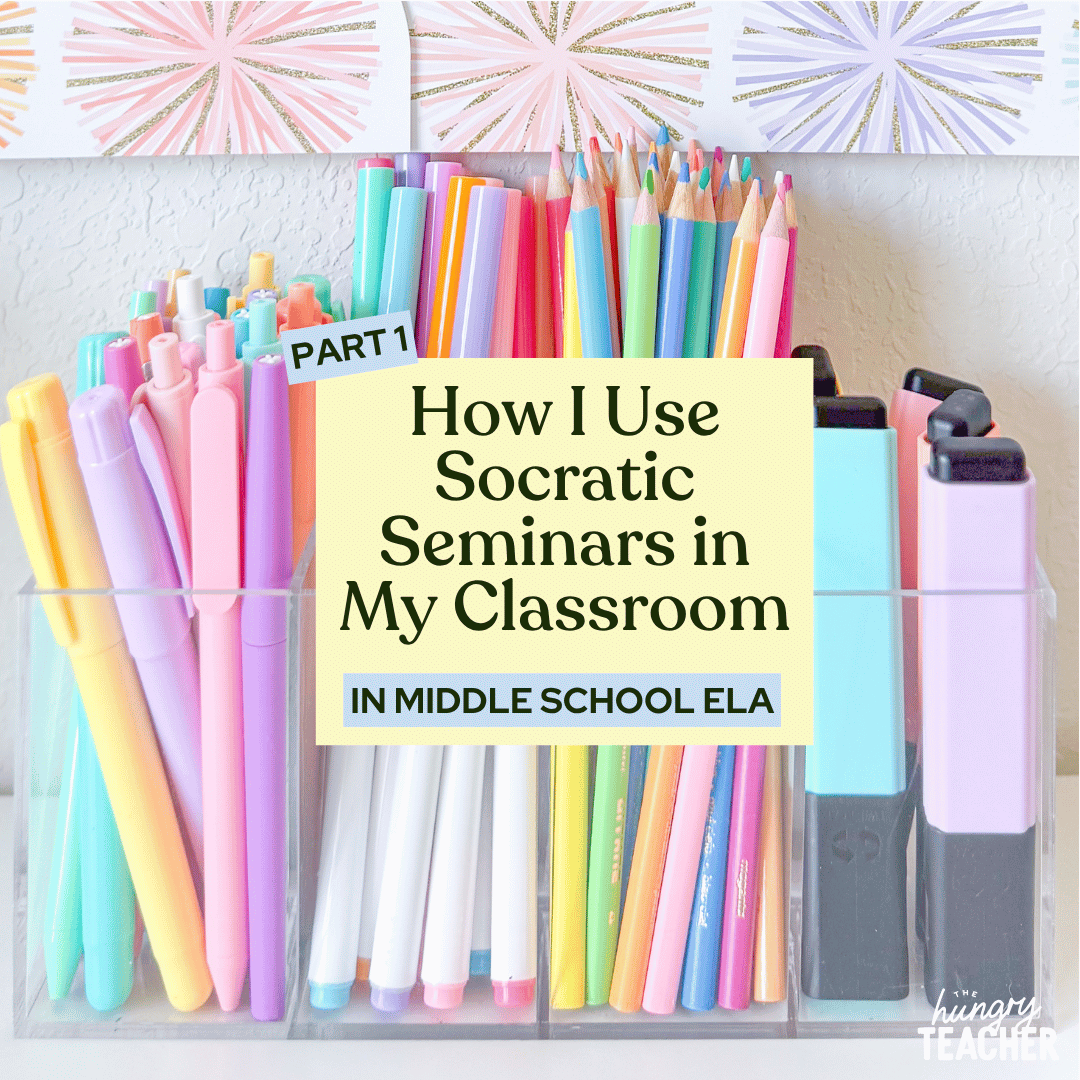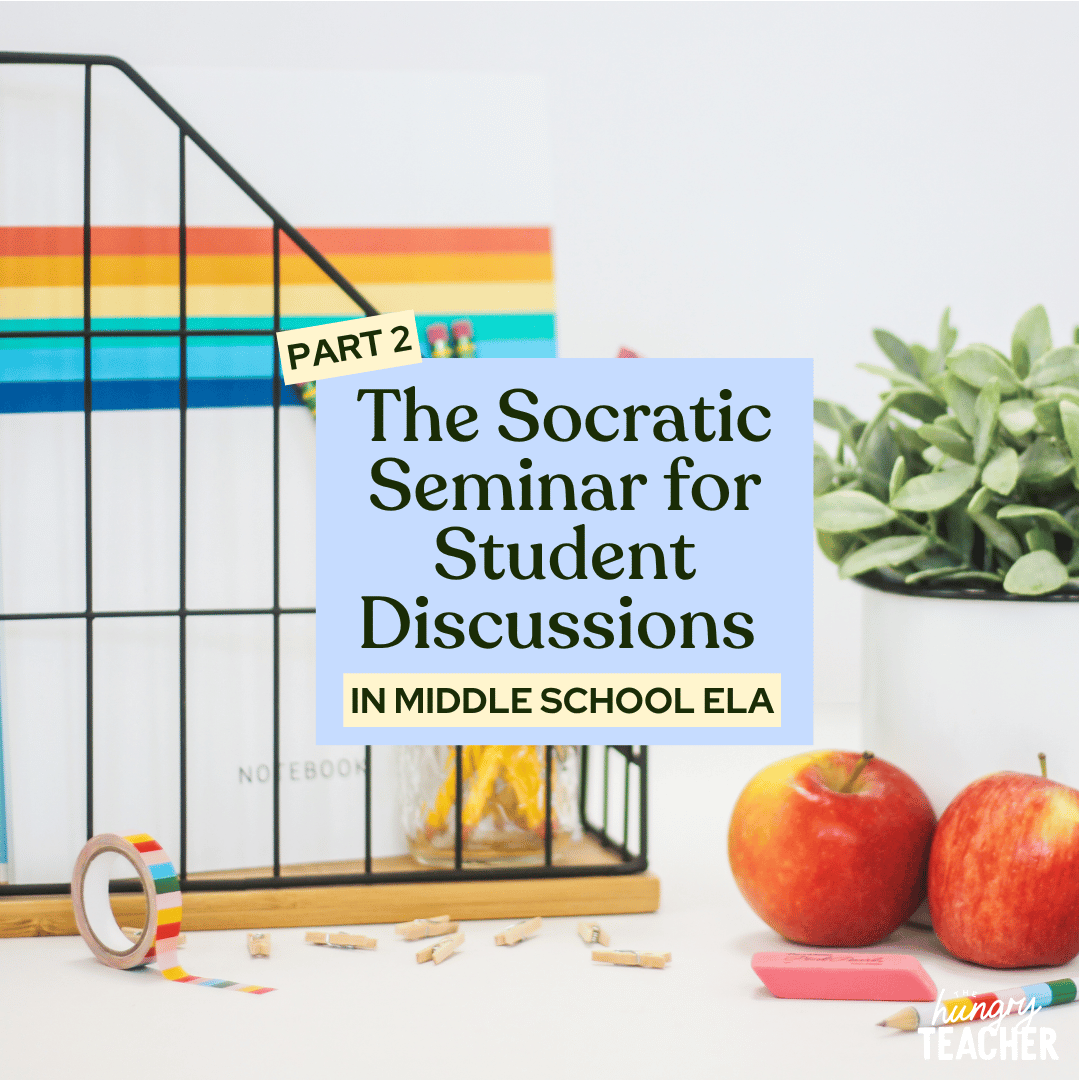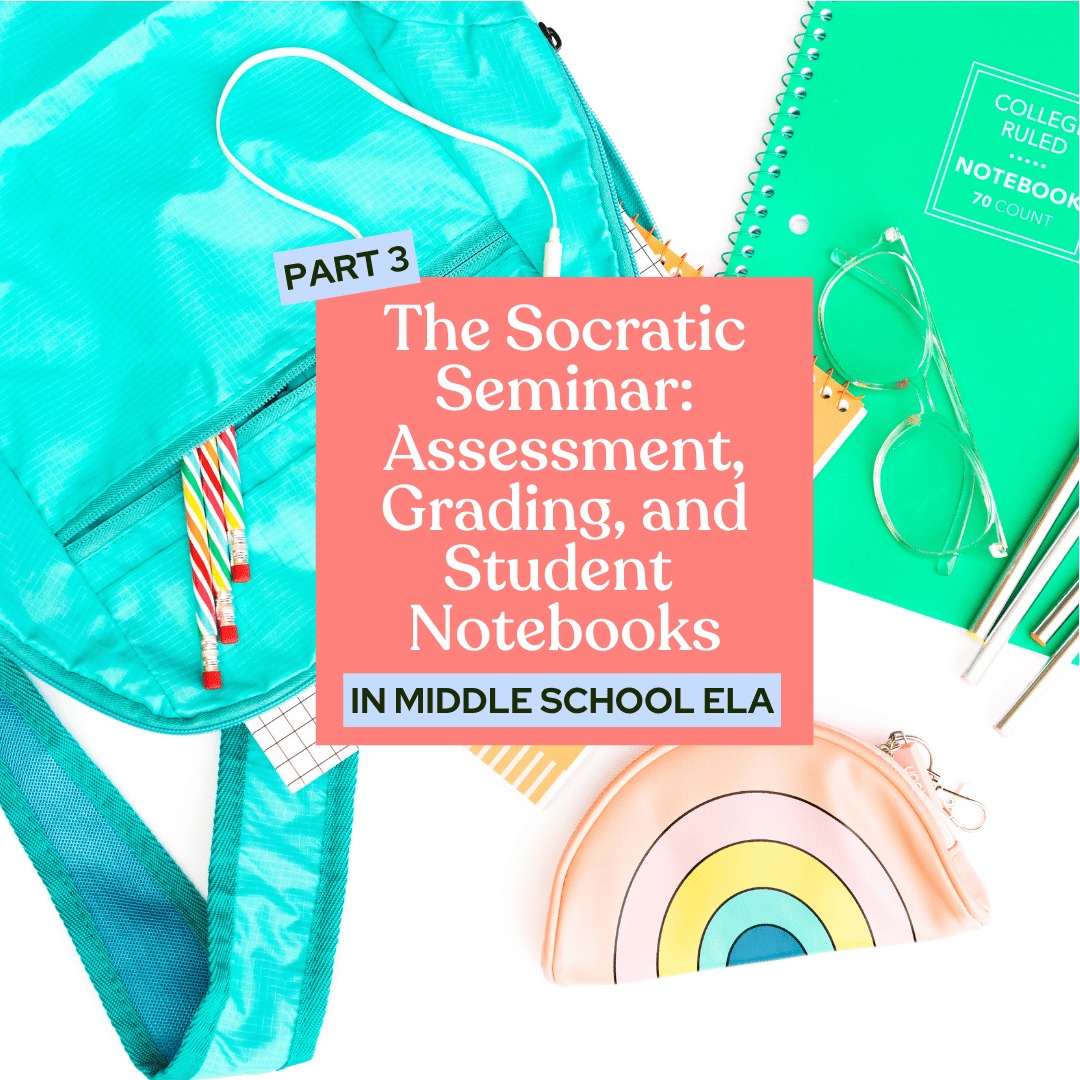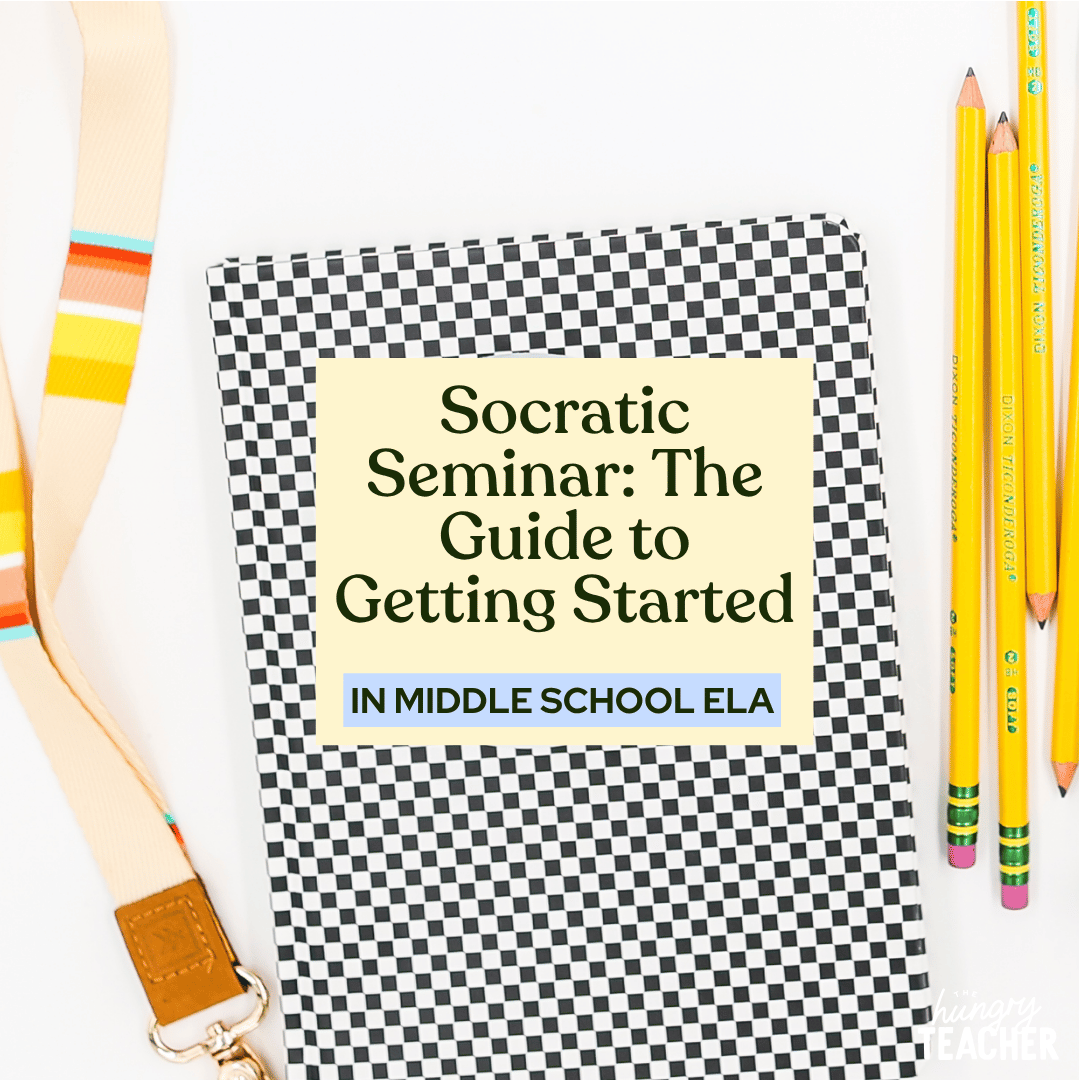hey friend!
I'm Martina.
I provide practical, time-saving strategies that actually work—so you can engage your students, teach effectively, and reclaim your time from the exhausting planning-grading cycle.
Browse Our ELA Resources
Socratic Seminar: The Guide to Getting Started
When you became an English teacher, you probably dreamed of reading fun books in class and having deep discussions. But the reality is – diving into those deep conversations takes more planning and guidance than we might have realized. Socratic seminars are a great way to dive deeper into reading and set the stage for better classroom discussions. So, how exactly do you prepare for a Socratic seminar?
We know engaging students in discussions about reading is essential. Discussion can give you insight into how students are feeling about a topic or text, build reading skills, and help students engage – in a healthy way.
What is a Socratic Seminar?
A Socratic seminar is a method named after Socrates. Socrates was all about asking questions, valuing discussion over debate, and prioritizing inquiry over information.
Basically, Socratic seminars play into the idea that learning is a social experience. When students engage and discuss with each other, they can deepen their understanding of a text. By asking students open-ended questions about a text, they can express and develop their own thoughts. There is no multiple choice here – students really have to dig into what details from the text led them to a certain conclusion.
They also hear the thoughts and ideas of other students. Maybe it influences what they think, or they can offer a different perspective! This discussion then allows students to learn to disagree while being respectful. Using Socratic seminars is a great way for ELA teachers to achieve their goal of having rich, deep classroom discussions.

How do I Prepare for the Socratic Seminar?
By now, you are probably on board with Socratic seminar. Deep classroom discussions? Sign me up! But how do you actually prepare for a Socratic seminar?
The first step is choosing a text. I highly recommend choosing an authentic text relevant to your content and your students. For instance, you might choose a poem for your poetry unit. And the narrator may have a relatable background or story.
Next, prepare for a Socratic seminar by setting expectations with students. They can’t have a Socratic seminar if they don’t know what’s coming. Let students know when the Socratic seminar will take place. Then, as students are reading, have them utilize sticky notes to annotate the text as they read – this will keep them actively reading and give them notes to refer back to.
Then, prepare your questions. This will take some practice, but create as many open-ended questions as you can about the text. Our students are smart: they are used to answering questions with what they think we want to hear. The goal of these questions is for them to spark exploration and allow them to fully explore their own thoughts and opinions.
Next, prepare for a Socratic seminar by setting class expectations. If you’ve never done a Socratic seminar before – don’t freak out! It won’t go perfectly the first time. But setting these expectations helps students know what to do. The key is to focus on the difference between a debate from a discussion, and then ask them to hold themselves accountable to that.
After that, really think about your role in the Socratic seminar. Socratic seminars aim for students to be the main participants rather than the teacher. While you will first provide the questions, it’s important to resist the temptation to redirect or correct and let students guide the discussion! This will take practice, so don’t be too hard on yourself.
Lastly, build reflection into the Socratic seminar. Do you feel students met the goal of the Socratic seminar? Reflect on whether students guided the discussion, how they interacted with one another, and what role you played. Then, if necessary, note what you’ll change for the next seminar to make it even more meaningful.
If you want to go more in-depth on preparing for the Socratic seminar, you can download my entire Free Implementation Guide for the Socratic Seminar here. I dive deep into the steps for preparing, how often you should use Socratic seminar, frequently asked questions, and more!
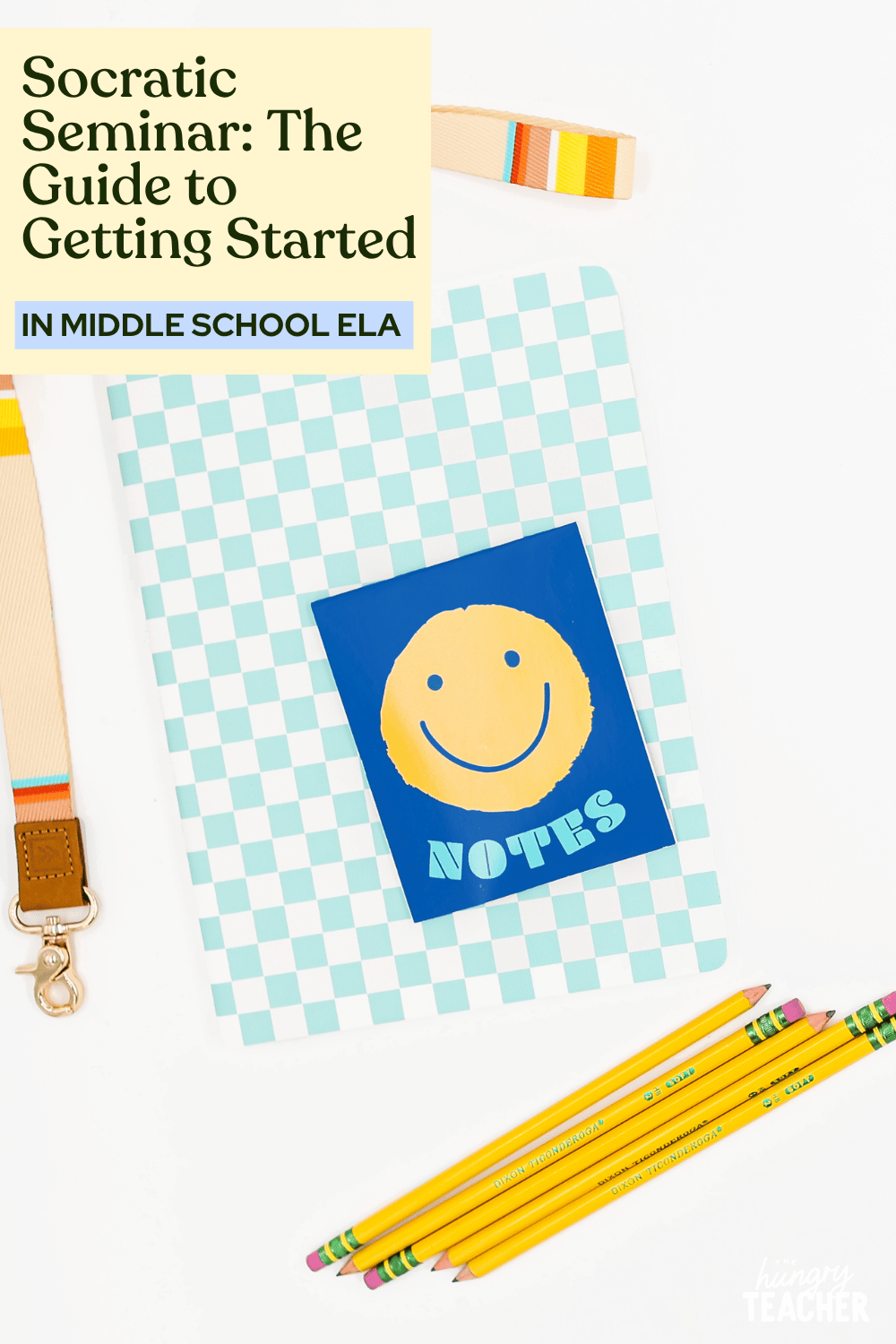
Frequently Asked Questions
It can seem intimidating when you first prepare for the Socratic seminar, so I want to answer some of the common questions I hear from teachers. For more questions, you can download the full Free Implementation Guide for the Socratic Seminar.
What if my students simply refuse to discuss?
We could go on about “what ifs” in education all day – but rarely do our biggest fears about a lesson come true! The key here is to be patient. If you try a Socratic seminar in your class and it’s a flop the first few times, join the club! Teaching new methods to students can sometimes take a few tries before it feels comfortable. You’ve worked hard to set up an environment where students feel comfortable sharing, and now is a great time to watch them shine.
What books should I use for Socratic seminar?
For Socratic seminar, you want to choose texts that are relevant to the content you teach and that have space for student interpretation. (Good news: so many books fit this criterion!) If you’re having trouble choosing a text, I have over 30 book units you can use with your students spanning a variety of genres. Check them out here!
How often do you use Socratic seminars?
This can vary depending on your schedule and frequency you see students, but in a middle school setting with multiple 55-60 minute class periods, I tried to do Socratic seminars once or twice a week.
How do you assess Socratic seminars?
This is a great opportunity to rethink what you are assessing! If the goal is to summatively assess comprehension of a novel, the Socratic seminar is not your best method. However, to fully participate in the Socratic seminar, students have to have comprehended what they read and have a deep understanding of their comprehension to talk about it in the seminar. They are also participating in tons of speaking and listening standards. I have included discussion rubrics in my Free Socratic Seminar Guide that you can use to assess if needed.

The Complete Guide to Socratic Seminar
If this all sounds like something you’d like to try with your class (and I hope you do!), you can check out all the details in my FREE Implementation Guide to Socratic Seminar. I explain the research behind Socratic seminars, go in-depth about strategy, and give lots of tips and tricks. I also answer more FAQs, share lots of example lesson plans, and share discussion rubrics!
Other helpful links and resources for The Socratic Seminar:
Want a sneak peek at teaching The Hungry Teacher way—with support, structure, and strategy?
When you join the waitlist for The Hungry Teacher’s Hub membership, you get three free classroom-ready resources: a theme unit, an expository writing unit, and a grammar unit introducing mentor sentences. Plus, you’ll get immediate access to a selection of exclusives from the Hub, including editable sub plans, pacing guides, and more.
No strings attached. Just resources you can use right now—and a heads-up when the Hub opens.
3 Free Middle School ELA Units—yours to keep!
JOIN THE WAITLIST + A FREE GIFT
Where to next, line leader?
Welcome to The Hungry Teacher! We create resources that are easy to use, practical, and get results. Teach with confidence—and make it home before dinner.
xo, the hungry teacher
